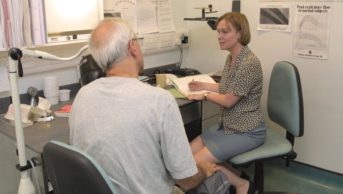
Shutterstock.com
A campaign to encourage doctors to stop routinely using interventions that are not supported by clinical evidence has been launched by the Academy of Medical Royal Colleges (AMRC).
Each of the colleges is surveying its members and will produce its own list of five procedures or interventions that are commonly used but have no proven benefit.
The AMRC hopes the initiative will trigger an end to the “over diagnosis and over treatment” culture in the NHS and replace it with one based on the belief that doing nothing can be the best option.
The Choosing Wisely campaign is based on a US and Canadian model. In Canada, more than 17 professional medical associations have recommended 103 different procedures or interventions that they say should no longer be used routinely, if at all.
The UK initiative was launched on 12 May 2015, with details published in an analysis article in The BMJ
[1]
.
“Diagnosis drives treatment, and in recent years the term over diagnosis has been used to describe various situations where diagnoses lead to unnecessary treatment, wasting resources while increasing patient anxiety,” the AMRC explains.
It wants to change how doctors practise to align with best practice by persuading them to stop using certain interventions, including those that duplicate tests or procedures already covered.
The AMRC argues that a culture where the onus is on doctors to do something at each consultation has bred unbalanced decision making.
The NHS helps to create this type of culture because it is based on payment by results, which is a disincentive to doctors to perform fewer procedures and interventions, the authors say.
The campaign’s success in the UK will depend on “objective evidence of effectiveness”, they add. If it works, it has the potential to reduce wasteful and harmful healthcare, which in turn will lead to better joint decision making with patients, the article says.
The Royal Pharmaceutical Society (RPS) is supporting the campaign on the grounds that evidence-based medicine should “define modern healthcare”.
“Every day unproven therapies are used, to the detriment of patient care and at cost to the NHS,” says RPS science adviser Jayne Lawrence. “By focusing on a solid evidence base, we give both health professionals and patients the best foundation on which to make decisions about their health. Only the process of rigorously testing treatments and collecting the resulting evidence moves medicine forward and improves patient care.”


